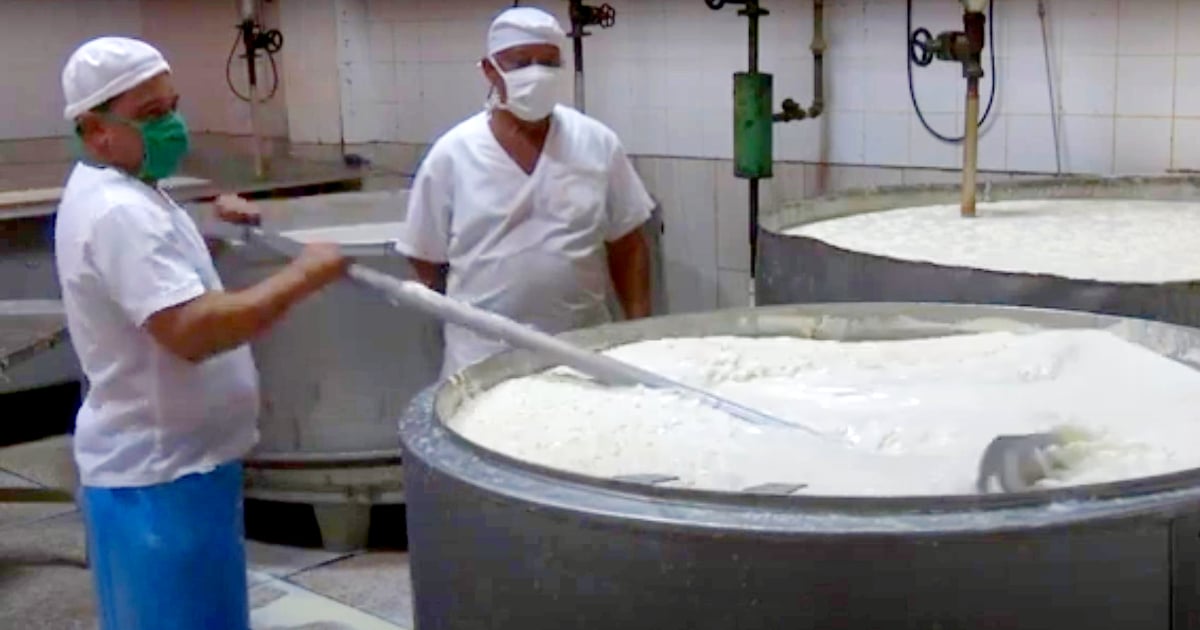The Cuban Ministry of Domestic Trade (MINCIN) has announced it will not be able to provide powdered milk for all children in the rationed family basket for December. According to the official statement, as an alternative, children in some provinces will receive a kilogram of chocolate breakfast mix, a decision that has sparked significant criticism and questions regarding the government's priorities and ability to meet the basic needs of its people.
A Limited Supply of Milk and a Chocolate Substitute
MINCIN clarified that children aged 0 to 2 years will have milk guaranteed until January 10, 2025. In certain provinces such as Mayabeque, Cienfuegos, Sancti Spíritus, Camagüey, and Las Tunas, fluid milk will be provided to children between 6 months and 1 year. Meanwhile, fresh milk will be distributed to those aged 2 to 6 years in Artemisa, Matanzas, Cienfuegos, and Granma. However, in other regions where powdered milk was traditionally distributed, children will receive the chocolate mix, underscoring the severe food crisis on the island.
Basic Goods Distribution Continues to Decline
This announcement comes amidst a continuous decline in the distribution of essential goods across Cuba. Previous reports have indicated that powdered milk, a vital product, has become unaffordable for many families due to its high price on the informal market and its scarcity in state-run stores. A recent article from CiberCuba highlighted that a kilogram of powdered milk can cost up to 5,000 pesos in the informal market, more than double the minimum wage, making it a luxury beyond the reach of most Cuban households.
Subsidy Cuts and Empty Ration Books
The crisis extends beyond milk. The Cuban government has recently cut subsidies for various items in the basic basket, citing severe economic hardships. This decision has fueled public dissatisfaction, especially in provinces like Artemisa and Villa Clara, where residents report long lines and delays in obtaining rationed items such as rice and oil. The removal of subsidies, rising prices, and inadequate distribution have been persistent issues in recent months. As many families rely almost entirely on rationed products to survive, substituting milk with chocolate mix is seen as an affront to their needs.
Public Outcry
Public reactions have been swift. Many Cubans took to social media to express their anger and frustration. "They can't even ensure powdered milk for children, yet there are always resources for political and propaganda events," one user remarked, referring to the recent March of the Combatant People. Another commented, "Replacing milk with chocolate isn't a solution; it's an admission that they can't solve the underlying problems."
Parents of young children, in particular, have been severely impacted. Milk is a crucial component of a child's diet, and replacing it with chocolate mixes raises concerns about the nutritional value of this alternative. International organizations have repeatedly warned about the effects of malnutrition on Cuban children, a situation that is increasingly worsening.
Challenges Beyond Milk
The MINCIN statement also addressed the distribution of other essential goods like rice, oil, chicken, and grains. Although it promises to prioritize vulnerable groups such as children and pregnant women, the deliveries fall short of meeting the population's needs. In provinces hit by hurricanes Oscar and Rafael, the additional aid includes small amounts of rice, peas, and oil, but these supplies are insufficient compared to the actual needs.
Prolonged Crisis Context
The absence of milk in the basic basket is not a new issue in Cuba. In Matanzas, frequent power outages in 2024 compromised the preservation of fluid milk, affecting distribution to children under six. Reports suggest that these electrical interruptions also impacted production, leaving families without access to an essential food item. In Guantánamo, the situation reached extremes in August 2023, as children aged seven to thirteen began receiving syrup as a milk substitute, a decision heavily criticized for its lack of nutritional value.
The government has attempted to find solutions on various fronts, such as seeking help from the UN in February 2024 to combat milk shortages and incorporating small and medium-sized enterprises into the dairy product supply chain. However, these measures have proven inadequate.
While the regime touts its production capabilities "thanks to Fidel," evidence suggests that food shortages persist, disproportionately affecting the most disadvantaged sectors. The food crisis in Cuba continues to deepen, particularly impacting children. A recent report highlighted how families face the reality of their children receiving milk only once every three days, at best. Such restrictions have significantly impacted child health and development, further fueling discontent with government policies.
In June, a report by the United Nations Children's Fund (UNICEF) included Cuba in its assessment of child nutrition, revealing that 9% of Cuban children suffer from severe food poverty, meaning they only have access to a maximum of two out of eight essential foods for a healthy life. The recent announcement by MINCIN regarding the basic basket not only showcases the Cuban government's inability to ensure essential products but also reflects the lack of an effective plan to address the population's basic needs. While the regime continues to blame the U.S. embargo for the crisis, Cubans face a reality marked by scarcity, hunger, and uncertainty.
Key Questions About Cuba's Food Crisis
Why is there a shortage of powdered milk in Cuba?
The shortage of powdered milk in Cuba is due to economic challenges and distribution issues, making it scarce in state-run stores and unaffordable on the informal market.
What alternative is being provided to children in place of milk?
As an alternative, children in some provinces will receive a kilogram of chocolate breakfast mix instead of powdered milk.
How have Cubans reacted to the milk shortage announcement?
Cubans have expressed outrage and frustration, criticizing the government's inability to meet basic needs while prioritizing political events.
What impact does the milk shortage have on Cuban children?
The lack of milk can significantly affect children's nutrition and development, raising concerns about their health and well-being.
